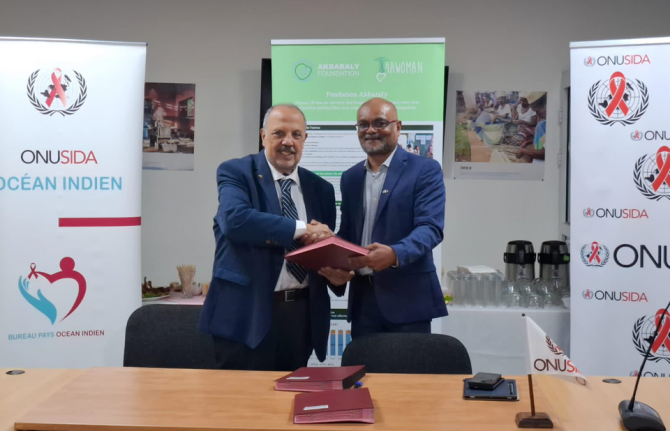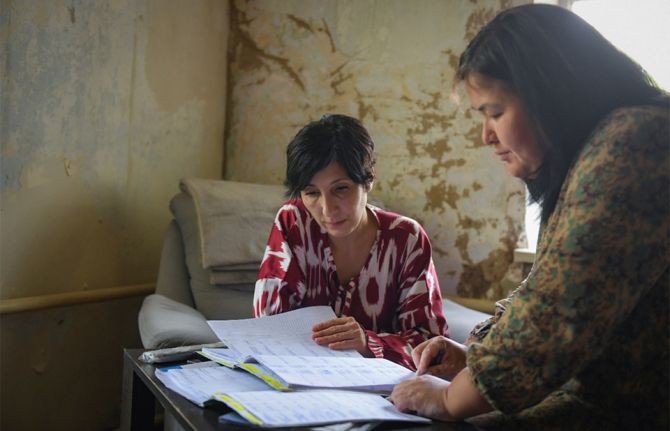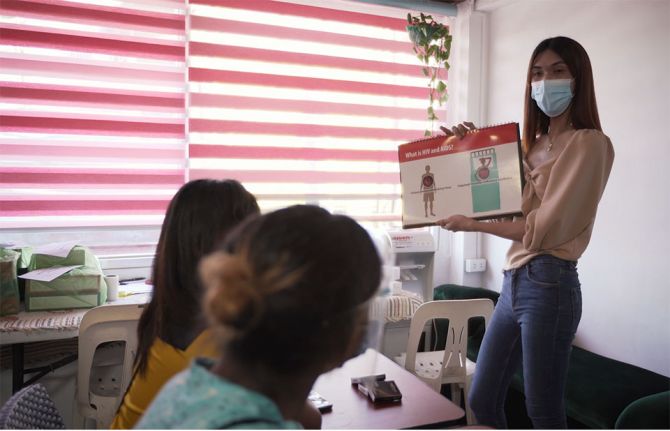

Feature Story
How the LGBTI community is surviving the COVID-19 pandemic in Indonesia
25 May 2021
25 May 2021 25 May 2021For Vanessa Chaniago, a young transgender woman living in Jakarta, Indonesia, the first few months of the COVID-19 pandemic were filled with fear. “I was really struggling to make ends meet. I had been working for a civil society organization, which was a great place to learn and develop strong networks, but unfortunately the income was not sufficient to sustain me and my family. My income drastically declined,” she said.
According to a survey conducted by the Crisis Response Mechanism (CRM) Consortium of 300 lesbian, gay, bisexual, transgender and intersex (LGBTI) people in Indonesia, the COVID-19 pandemic has caused most LGBTI people to have experienced layoffs or reductions in income or to close their businesses. Most LGBTI people work in sectors with a higher risk of COVID-19: 20.5% in the beauty industry, 19.5% in the health sector and 12.8% in the service industry. Unfortunately, most of the respondents do not have long-term savings—30% would only be able to survive for two to three months on their savings, and 64% are not able to access loans.
Reflecting back on more than a year of the pandemic, Ms Chaniago said that the situation didn’t rapidly improve and instead got more challenging as time went on. “I decided to start a small business, selling beef rendang and other Indonesian street food. Opening a business during the pandemic wasn’t ideal, and not long after the opening I had to close down my store. Now I continue my small business on the streets.”
Ms Chaniago is determined to survive these trying times and she recognizes that many of her fellow transgender women face bigger hurdles. Many transgender people in Indonesia do not have identity cards, leaving them unable to access social support from the government. The CRM survey found that 51% of respondents did not receive social support from the government and those that tried to receive it faced many challenges in accessing it.
On top of the socioeconomic struggles they face, discrimination and violence towards the LGBTI community continues—transgender women in Jakarta have even been pranked with aid packages filled with garbage. The CRM survey also found that violence against LGBTI people increased.
Keeping in touch virtually among the community has been essential. Ms Chaniago said, “I want to tell my fellow LGBTI peers that they are not alone. As a community, we must continue to help each other out and fight for what is right.” Unfortunately, the CRM survey found that the community cannot always turn to peers for support, as many don’t have devices or enough Internet data to contact their friends.
Despite the huge hardships, there is a strong sense of optimism and hope for a better life after the pandemic. To get there, however, the LGBTI community needs support, including form the government and the public.
“Everyone has been affected by COVID-19. In Indonesia, many vulnerable groups have struggled to survive not only the pandemic but the devastating impact of loss of livelihoods and income. UNAIDS works with partners to strengthen the protection of vulnerable groups from stigma and discrimination in order to increase equitable access to support and services,” said Krittayawan Boonto, the UNAIDS Country Director for Indonesia.
The CRM Consortium consists of UNAIDS Indonesia and four national civil society organizations—Arus Pelangi, the Community Legal Aid Institute, Sanggar Swara and GWL-Ina. In addition to the survey, the CRM Consortium has mobilized resources for LGBTI people affected by the pandemic through the distribution of food packages, sanitation packages and rent allowances.
The results of the survey are highlighted in a video here.
Our work
Region/country

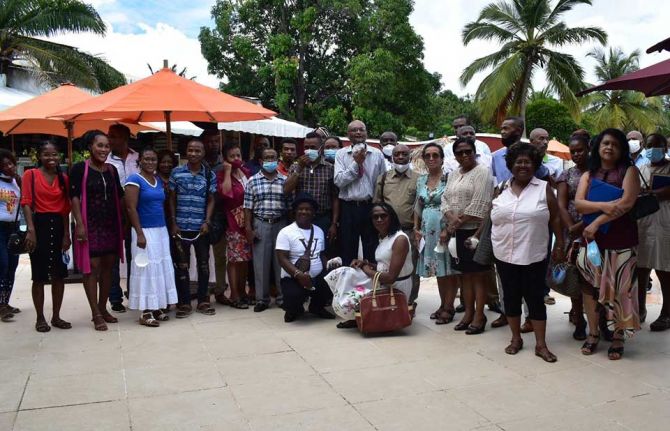
Feature Story
UNAIDS and its partners implement Partnership to Accelerate COVID-19 Testing in Madagascar
18 May 2021
18 May 2021 18 May 2021UNAIDS is partnering with the Africa Centres for Disease Control and Prevention (Africa CDC) to support the roll-out of the Partnership to Accelerate COVID-19 Testing (PACT) in Africa, including Madagascar.
The PACT initiative, launched by the Africa CDC in April 2020, aims to conduct 10 million COVID-19 tests on the African continent. PACT has three pillars: test, trace and treat, which cover the procurement and distribution of COVID-19 test kits, the deployment and training of one million community health-care workers to support contact tracing and monitoring, and COVID-19 sensitization measures.
With funding from PACT, Madagascar is implementing a project to strengthen the engagement of civil society in the national COVID-19 response in the country. The first phase of the project has been initiated in six districts of the former province of Mahajanga, part of the Boeny region in south-west Madagascar.
Mahajanga has been chosen for the first phase because of its high HIV prevalence among key populations. According to a 2016 national survey, HIV prevalence is particularly high among sex workers, at 22.7% in 2016. As the former province is frequented by tourists, there are also concerns that another wave of COVID-19 may occur.
UNAIDS, the National AIDS Council, the Ministry of Health, at least 40 representatives of networks of people living with HIV and networks of lesbian gay, bisexual and transgender people (LGBT), a representative of the Mayor of Mahajanga and representatives of the health centre, local school and prisons attended a launch of the project. During the launch, 60 bottles of bleach were offered to the municipality to assist tuk-tuk drivers in Mahajanga with hygiene, as they and their passengers are at higher risk of COVID-19 infection.
Five community-led organizations have been identified to develop an implementation plan for the PACT project. The plan will be finalized after the results of a situational analysis of the impact of COVID-19 in the Boeny region are made available. The main recipients of the project are an estimated 136 000 people—people living with HIV, adolescents both in and out school, prisoners and key populations.
The project will engage local authorities and beneficiaries to contribute to effective implementation of the PACT project in Mahajanga and to the intensification of COVID-19 tests, with a particular emphasis on strengthening demand generation and contact tracing.
“We are proud to be among the seven African countries to receive funds to support the deployment of PACT,” said Jude Padayachy, the UNAIDS Country Director for Madagascar. “This project focuses on the COVID-19 response among people living with HIV, LGBT people, young people and adolescents, who have difficulty accessing care due to stigma and discrimination. No one should be left behind.”
Our work
Region/country

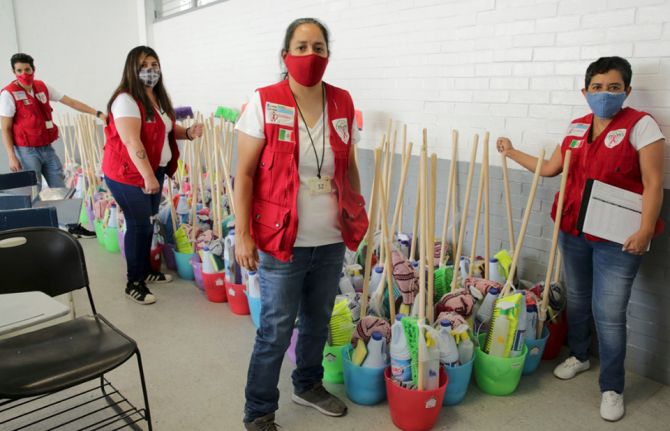
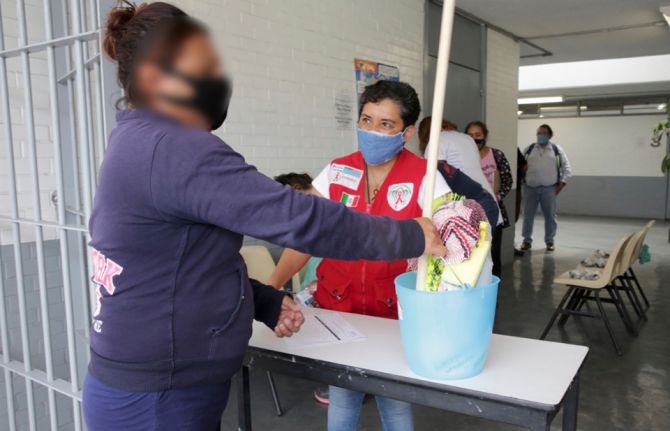
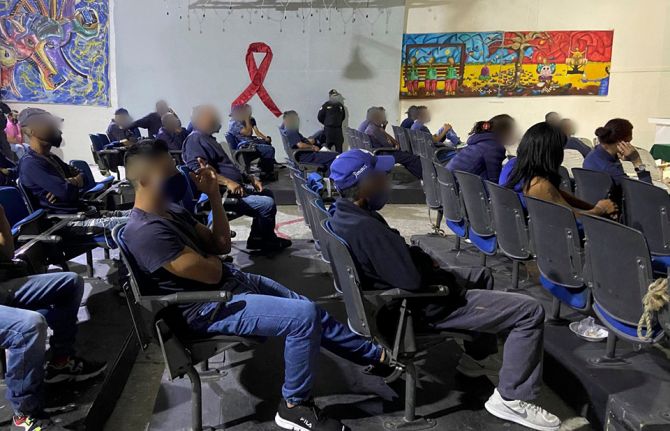
Feature Story
Protecting prisoners from HIV and COVID-19 in Mexico
14 May 2021
14 May 2021 14 May 2021“AIDS came to my door as a surprise. It all started in 1988, when my partner, Rafael, started to get sick. We were both 28 years old at the time,” said Georgina Gutiérrez, who has been a human rights activist for people living with HIV in Mexico for more than 30 years.
Today, she is a representative of the Mexican Movement for Positive Citizenship, which aims to promote the empowerment of people living with HIV in prison. She is also part of the Latin American and Caribbean Movement of Positive Women.
“In those years, stigma and discrimination were widespread. I knew about HIV only through television and many women who had HIV-positive partners assumed they were living with HIV without ever having been tested,” she said.
Her partner was imprisoned in Santa Martha Acatitla Penitentiary in Mexico City, where he spent eight years. This was when she got to know the reality inside prison, and it was this experience that would set the course of her life towards working with jailed people living with HIV.
“People living with HIV in prison are invisible to society. I remember many years ago, as a protest they would burn their mattresses, just to demand dignity in their access to HIV treatment,” Ms Gutiérrez recalled.
Ms Gutiérrez knew that there was a need for action to protect the physical and mental health of people living with HIV in prison. This is how she and others started a project against HIV and COVID-19 in the Santa Martha Acatitla Penitentiary.
The project is one of 30 initiatives selected from more than 190 applicants for the UNAIDS 2020 call for proposals for community-based organizations working on HIV in Latin America and the Caribbean that received funding. The project received an award of US$ 5000 to help its work.
The Santa Martha Acatitla Penitentiary houses around 2000 inmates, including 180 people living with HIV, some in the advanced stages of AIDS-related illnesses. People living with HIV are concentrated in Dormitory 10 in the prison.
“Dormitory 10 is overcrowded and physical distancing is difficult. Hygiene standards were low. In addition, most of them had not received COVID-19 personal protective equipment—the very few who were able to access such equipment did so through their families,” said Ms Gutiérrez.
In addition to the 180 people living with HIV in the prison, each of whom received personalized face coverings and other personal protective equipment and who attended a series of trainings, approximately another 1000 staff and inmates benefited from the project.
“I have been able to see them change. They have told me many times that they feel safer with the tools and knowledge they have gained,” said Ms Gutiérrez. “They feel good to know there are people concerned about them during this health crisis.”
“With our trainings and donations, the prisoners can now keep their rooms clean and can frequently wash their hands, clothes and personal belongings.”
Working for HIV prevention is, “A commitment I have in every drop of my blood,” she said. “With these actions, we are giving life to forgotten people. I thank UNAIDS for financing this project—with it we are supporting a population that is being left behind.”
On any given day, approximately 11 million people worldwide are incarcerated. The risk of sexual violence among prisoners—and their inadequate access to condoms, lubricants, pre-exposure prophylaxis and harm reduction services—increases their chances of contracting HIV, hepatitis C and other sexually transmitted infections.
Region/country
Related

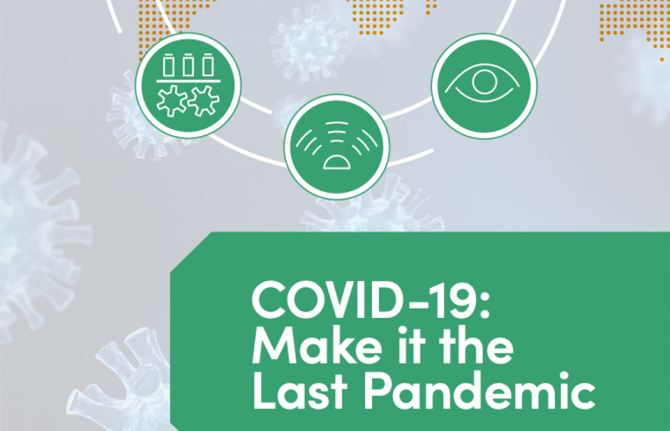
Press Statement
COVID-19: make it the last pandemic
12 May 2021 12 May 2021GENEVA, 12 May 2021—UNAIDS strongly welcomes the report and recommendations of the Independent Panel on Pandemic Preparedness and Response. Amongst others, the panel calls for the establishment of a Global Health Threats Council with participation at the highest political level to coordinate global action against pandemics and secure agreement between governments in aligning efforts to tackle the health, social and economic challenges of major pandemics.
“The Independent Panel's recommendations are a wake-up call for transforming health systems across the world,” said Winnie Byanyima, Executive Director of UNAIDS. “Health is a universal public good in this interconnected society—no one is safe, until everyone is safe so we must reimagine health to provide the same quality of care regardless of geography, income or social status.”
UNAIDS shares the panel’s concerns on the impact of COVID-19 in deepening inequalities within and across countries. There has been a particularly uneven burden that women have had to endure. Despite constituting almost 60% of the health workforce and front-line workers, the needs of women have not been included in most COVID-19 responses, increasing the inequality gap.
“Like HIV, COVID-19 has exploited the fault lines of society and exposed the fragility of recent gains in public health, added Ms Byanyima. “Lessons from the AIDS response can help shape a new paradigm for global health in which people are placed at the centre, inequalities are erased and the right to health is enshrined in every part of the world.
UNAIDS also commends the report in highlighting the urgency for vaccine equity in calling for the urgent redistribution of 1 billion vaccines from rich to limited-resource countries by September 2021 to be followed by another 1 billion doses to be redistributed during 2022.
UNAIDS fully supports the call for G7 countries to commit to providing 60% of the US$ 19 billion required for ACT-A in 2021 for vaccines, diagnostics, therapeutics and strengthening health systems with the remainder being mobilized from others in the G20 and other higher income countries. A formula based on ability to pay should be adopted for predictable, sustainable, and equitable financing of such global public goods on an ongoing basis.
UNAIDS stands ready to support efforts to build pandemic resilience and preparedness, specifically building on UNAIDS experience with community-led responses, activism and rights-based approaches, and in leveraging investments in the unique HIV infrastructure and networks to create resilient health systems. UNAIDS urges all partners to apply the lessons learned from the HIV response to ensure a community led, equitable and human rights-based approach to support stronger pandemic preparedness and responses to ensure health for all.
HIV and pandemic preparedness will be discussed at the UN General Assembly High-Level Meeting on HIV between 8-10 June.
UNAIDS
The Joint United Nations Programme on HIV/AIDS (UNAIDS) leads and inspires the world to achieve its shared vision of zero new HIV infections, zero discrimination and zero AIDS-related deaths. UNAIDS unites the efforts of 11 UN organizations—UNHCR, UNICEF, WFP, UNDP, UNFPA, UNODC, UN Women, ILO, UNESCO, WHO and the World Bank—and works closely with global and national partners towards ending the AIDS epidemic by 2030 as part of the Sustainable Development Goals. Learn more at unaids.org and connect with us on Facebook, Twitter, Instagram and YouTube.
Our work

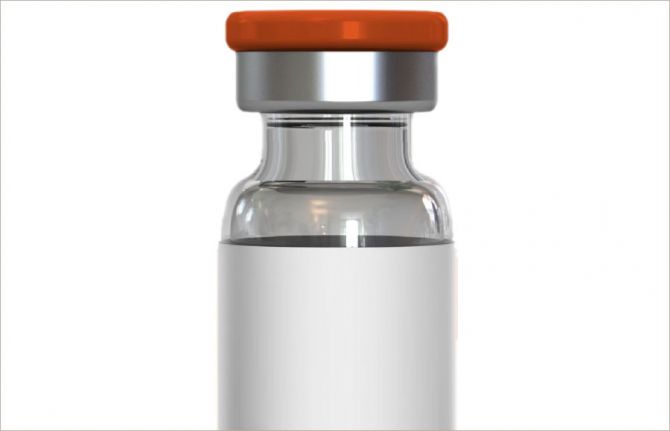
Press Statement
Statement from the Executive Director of UNAIDS, Winnie Byanyima on the decision by the United States of America to support the TRIPS waiver for COVID-19 vaccines
06 May 2021 06 May 2021I applaud the announcement from United States Trade Representative Katherine Tai supporting the waiving of intellectual property protections for COVID-19 vaccines.
This is the kind of global leadership the world desperately needs as we witness horrific scenes in countries like India, where only nine in 100 people have been vaccinated. To date, more than 1.1 billion doses of vaccine have been administered globally, but more than 80% of those have been administered in high- and upper-middle income countries, while just 0.3% have been administered in low-income countries.
We are in a race to vaccinate the majority of the world’s population to curb death tolls and before more potent variants of COVID-19 emerge, rendering current vaccines ineffective. The faster we can scale up global vaccine supply, the faster we can contain the virus and the less chance we will face a day when variants prove resistant to existing vaccines. As the United Nations Secretary-General, Antonio Guterres has said “no one is safe until everyone is safe”.
The TRIPS waiver would enable the sharing of technologies, data, know-how, patents and other intellectual property rights across the world. The announcement of the US administration sends a powerful signal to the rest of the G7 and to the European Union to also support the World Trade Organization TRIPS Waiver and inspire other countries to take a powerful stand in favour of people before profits. This remarkable position from the US government is a fundamental step towards a People’s Vaccine.
To ensure everyone, everywhere has access to a lifesaving vaccine, we also need to see a pooling of technology through the World Health Organization’s COVID-19 Technology Access Pool, as well as financing to help build a network of vaccine manufacturing in developing countries. These three actions can together build a sustainable system to vaccinate the world, reach the needed herd immunity and open the paths to make the world best prepared for future pandemics.
As we have learned from 40 years of fighting AIDS, equitable access to medical technologies is critical both for saving lives and for decreasing the impact of infectious diseases on people, communities and nations.
We are grateful to President Biden and his Administration for the generous humanitarian pledges made on COVID-19 and for the announcement.
UNAIDS
The Joint United Nations Programme on HIV/AIDS (UNAIDS) leads and inspires the world to achieve its shared vision of zero new HIV infections, zero discrimination and zero AIDS-related deaths. UNAIDS unites the efforts of 11 UN organizations—UNHCR, UNICEF, WFP, UNDP, UNFPA, UNODC, UN Women, ILO, UNESCO, WHO and the World Bank—and works closely with global and national partners towards ending the AIDS epidemic by 2030 as part of the Sustainable Development Goals. Learn more at unaids.org and connect with us on Facebook, Twitter, Instagram and YouTube.
Our work

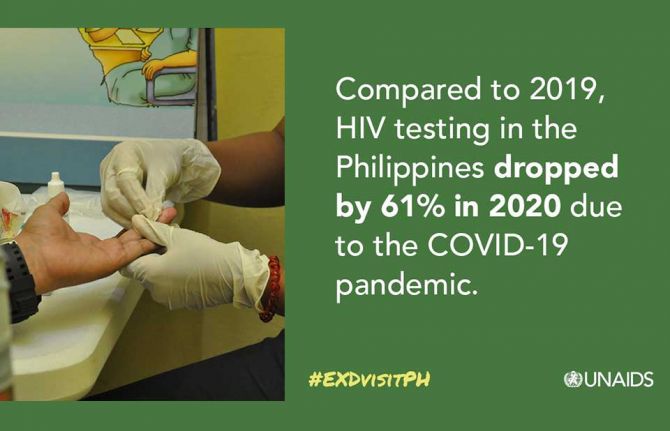
Feature Story
Community-led HIV services stepped up in the Philippines during the COVID-19 pandemic
11 May 2021
11 May 2021 11 May 2021The HIV response in the Philippines has been hit by the COVID-19 pandemic, especially access to HIV prevention and treatment services. According to the Global Fund to Fight AIDS, Tuberculosis and Malaria, in Metro Manila coverage of HIV prevention services for gay men and other men who have sex with men has decreased by 74% since 2019. Government figures show that compared to 2019, in 2020 HIV testing decreased by 61% and enrolment in HIV care reduced by 28%. The COVID-19 pandemic has drawn attention to socioeconomic divides, highlighting failures within the health system to adequately deal with not one pandemic but two.
Despite this, what has been clear from the onset of the COVID-19 outbreak is that civil society and communities have stepped up to the challenge to provide HIV services while navigating through restrictions on movement and lockdowns. One example is the Family Planning Organization of the Philippines (FPOP), a civil society health service provider and advocate of sexual and reproductive health and rights with a network of more than 1000 community-based services across the country. One of those service providers is the Rajah Community Center, a primary HIV clinic located in Iloilo City in the Western Visayas region of the Philippines, which provides HIV services for key populations, including young key populations, in a friendly and stigma-free environment.
“When I tested positive for HIV, I knew nothing about it. I did not know how to protect myself from it and talking about sex was taboo in my house. My friends and I were clueless about condoms,” said Jhenard Jude, a young person from Iloilo City. After receiving his positive diagnosis, Mr Jude learned about the Rajah Community Center. “I heard from my friends that Rajah provides youth-friendly services. I was worried about how others would look at me because of my status, but the staff at the clinic were non-judgemental and very friendly. I was given a care worker who supported me every step of the way to access antiretroviral therapy,” he said.
“This is home to me. I got my HIV self-test kit here in June 2020. Rajah is safe and convenient,” said Lloyd Legario, a young person who regularly visits the clinic for HIV testing and prevention services.
Winnie Byanyima, the UNAIDS Executive Director, has been learning about the Rajah Community Center during a two-day virtual mission to the Philippines to engage with communities, civil society and the government about the country’s response to HIV and COVID-19. During her virtual visit, Ms Byanyima was given a pre-recorded tour of the community clinic and had an open dialogue with Mona Liza S. Diones, the Chapter Program Manager of FPOP Iloilo, Robert Figuracion, the Rajah Community Center Clinic Officer, and three clinic clients from key populations.
“I had the pleasure to speak with some very courageous people who were very open about their experiences at the Rajah Community Center. I extend my deepest gratitude and solidarity to community-based organizations and frontline workers for stepping up and providing essential services during COVID-19,” said Ms Byanyima.
To ensure the continuity of HIV services during COVID-19, FPOP Iloilo worked closely with the Philippines Department of Health, local government units and other treatment hubs and support groups to serve key populations and people living with HIV. Blended services that included online counselling and onsite services covered prevention commodities, testing services, treatment and medical care. This also included providing psychosocial services, which have seen a sharp rise in demand since the first COVID-19 outbreak. Telemedicine and mobile clinics became new channels for differentiated care. Innovative programmes to deliver antiretroviral therapy to clients were established and pre-exposure prophylaxis (PrEP) and condoms were frontloaded to community champions for distribution.
During the virtual visit, Ms Byanyama also learned about the HIV & AIDS Support House (HASH), another renowned community-led service provider, which in coordination with the Department of Health has worked to prevent disruption to HIV services during COVID-19. HASH offers community-based screening, PrEP, HIV referral services, medical assistance to children living with HIV and psychosocial support to key populations. “Civil society organizations were quick to respond to the situation by coming out with innovative courses of action, such as online counselling, alternative modes of antiretroviral therapy delivery and mobilization of volunteers and partners to assist those who were affected by the COVID-19 pandemic,” said Desi Drew Ching, the President of HASH.
“To sustain community-led services, government and development partners have to optimize collaborative partnerships with civil society. This will strengthen their leadership capacities and enhance civic space funding through social contracting programmes,” said Louie Ocampo, the UNAIDS Country Director for the Philippines.

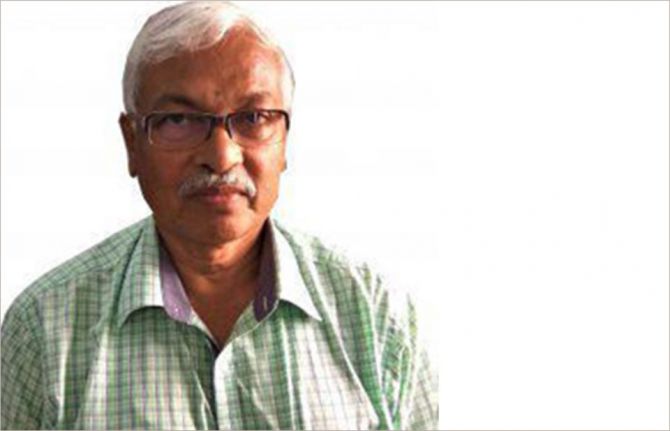
Feature Story
UNAIDS saddened by the death of Smarajit Jana
10 May 2021
10 May 2021 10 May 2021By Nandini Kapoor, Community Support Adviser, UNAIDS Country Office for India
The death of Smarajit Jana has left us shaken. True to his nature, he fought COVID-19 valiantly, but sadly the champion for the response to HIV succumbed to the coronavirus.
How do you begin to describe Mr Jana? A medical doctor, a public health specialist, an epidemiologist, a researcher and academician, an ardent advocate for the response to HIV and the architect of India’s national HIV response for key populations, a champion of human rights and the dignity of sex workers, the founder of the Durbar Mahila Samanwaya Committee (DMSC) collective of sex workers, a winner of national and international honours and accolades, a distinguished voice in domestic and global forums, and much more.
A great leader, an incomparable professional and, above all, a human being par excellence, he gave voice to the most vulnerable and the most marginalized to ensure they were heard and their dignity respected. He touched innumerable lives. Words are not enough to capture the range of his work and the difference he made to so many lives. What he did is etched in the hearts of the lives he touched—with warmth, with love, with affection.
He was a man of science, with his heart firmly anchored in the community he served. He brought science to the community level simply and brilliantly. And the reverse was true—he could easily translate policy and science in simple words for the community to understand.
I first met Mr Jana when I joined UNAIDS 18 years ago. We had organized a meeting for key populations and invited representatives of DMSC, since it had been key to the sex worker movement in India. We were told that they would attend, but not without Mr Jana, their guide, mentor and father figure. That was the level of trust and confidence they had in him. He spoke for their rights and ensured that the reality in the field was brought to the meeting table.
His skill at listening to the community and overlaying what he heard with policy discourse helped to move community-friendly strategies as part of the national HIV response. His presence at every meeting was full of energy and passion.
I have had several conversations with Mr Jana on a range of programmatic issues—the changing nature of sex work, preexposure prophylaxis, collectivization, decriminalization and much more, and each conversation was a learning experience for me.
I will miss him, above all his sage counsel and mentoring. But he will live on—in the work that he did and in the hearts of the vast numbers he impacted.
Our prayers are with his family and the thousands of people whose lives he touched and made better. Om Shanti.
Our work
Region/country

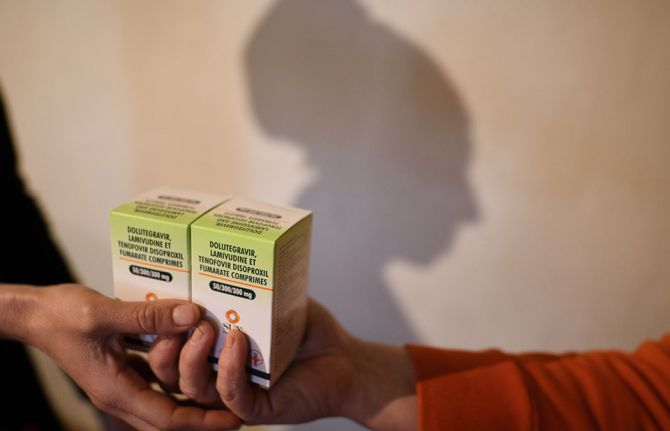
Feature Story
Big drops in the cost of antiretroviral medicines, but COVID-19 threatens further reductions
03 May 2021
03 May 2021 03 May 2021Civil society activism and competition from manufacturers of generic drugs drove down the prices of antiretroviral medicines from about US$ 14 000 per person per year for first-line regimens in high-income countries in 1990 to about US$ 1200 per year in low- and middle-income countries in 2003. By 2018, the price per person per year in sub-Saharan Africa was under US$ 100 for most fixed-dose combinations that include tenofovir. The prices of other fixed-dose combinations also have continued to decline over the past few years.
UNAIDS estimates that the market value for generic antiretroviral medicines within low- and middle-income countries was about US$ 1.8 billion in 2018. Approximately 80% of generic antiretroviral medicines procured by low- and middle-income countries are currently manufactured in one country: India.
While there remains significant scope for further price reductions in countries where generic antiretroviral medicines are not yet easily accessible, disruptions caused by the COVID-19 pandemic could have the opposite effect. Lockdowns, disruptions to production, border restrictions and transport disruption threaten to affect the supply of materials and the manufacture and distribution of HIV medicines, with tighter supply factors possibly leading to pressure on market prices.
Our work
Related

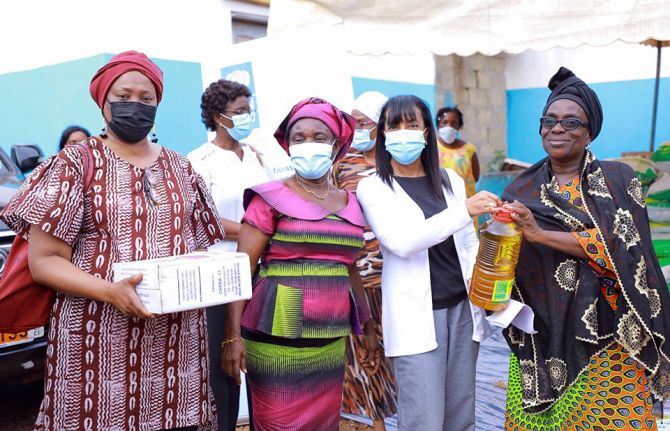
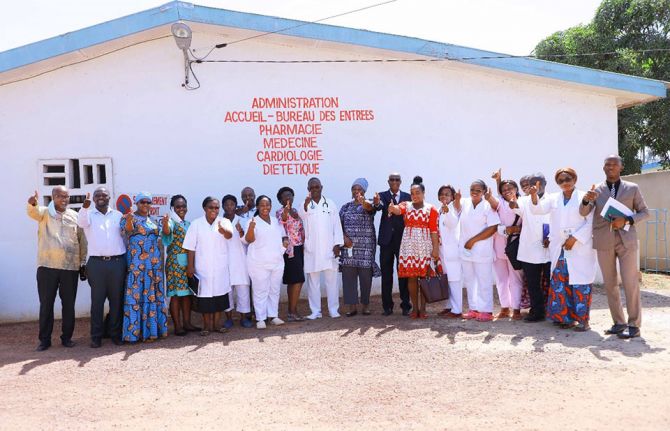
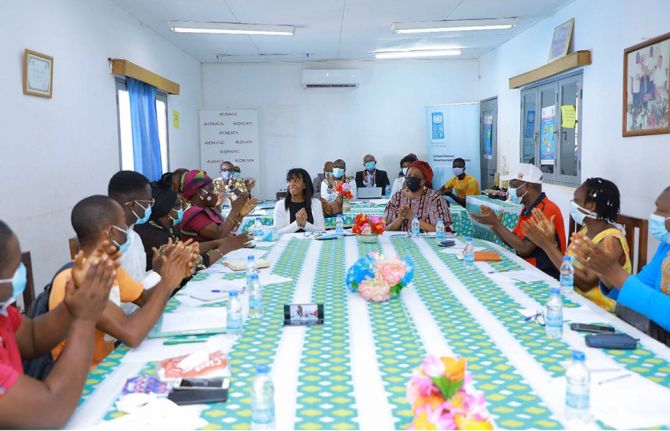
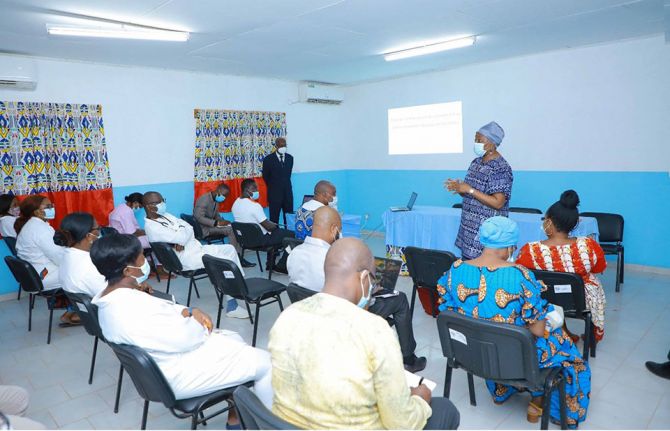
Feature Story
Joint mission supports the response to HIV in Gboklè/Nawa/San Pedro, Côte d'Ivoire
30 April 2021
30 April 2021 30 April 2021The Gboklè/Nawa/San Pedro region is the second largest economic hub in Côte d’Ivoire and one of the regions most affected by the HIV epidemic. The region attracts many workers because of its important economic and industrial activities, mainly related to the port and agriculture, as well as sex workers and other members of key populations.
A joint United Nations Development Programme (UNDP)/UNAIDS mission to the region from 16 to 20 April learned about the realities of the HIV response in the region in the context of COVID-19 and assessed how the response takes into account the needs of the most vulnerable.
The mission first paid a courtesy call on the region’s administrative and health authorities, and then quickly focused on the sites where services are offered to people living with HIV and key populations. In the health-care facilities visited, whether at the Regional Hospital of San Pedro, above, or at the health centre of APROSAM (Association pour la Promotion de la Santé de la Femme, de la Mère et de l’Enfant) nongovernmental organization, the mission team saw the commitment and determination of the health-care teams and the administrations of the facilities. “We have set up a quality assurance team within the hospital to guarantee services centred on the needs of each patient,” said Alexandre Kissiedou, the Director of the Regional Hospital of San Pedro.
The visit to APROSAM was one of the most captivating moments of the mission. During the visit, the mission team had in-depth discussions with representatives of a dozen associations, who had come to APROSAM’s headquarters to meet the mission delegation. Useful discussions took place with representatives of associations of people living with HIV and associations representing key populations, as well as with representatives of nongovernmental organizations working with young people.
“It is the first time that civil society is honoured with the visit of the country representatives of two United Nations agencies,” said Odette Koffi, the Executive Director of APROSAM, an association involved in the response to HIV, tuberculosis and malaria in the region. She also noted that civil society is truly committed to the HIV response but lacks the means to meet the needs of all.
“Income-generating activities are no longer working as they used to. Today we can’t even feed ourselves properly and we can’t take antiretroviral medicines on an empty stomach,” said Maya Rose Nean, the head of the local CERBAS association for women living with HIV, when describing how COVID-19 had impacted women living with HIV in the country.
Brigitte Quenum, the UNAIDS Country Director for Côte d’Ivoire, speaking on behalf of the delegation, underlined the vital work of nongovernmental organizations in the HIV response and praised the commitment of civil society organizations, people living with HIV and key populations. She said that a dialogue between UNDP and UNAIDS will address some of the pressing needs discussed with civil society. A donation of 400 food and hygiene kits was made by UNDP and UNAIDS to vulnerable people living with HIV and key populations.
The last day of the mission focused on human rights, with a visit to the Elan d’Amour reception centre, above, which offers temporary accommodation to people living with HIV and people who are victims of stigma, discrimination and gender-based violence, including people who come from remote areas for care and/or to collect their antiretroviral therapy. The delegation then visited a legal clinic supported by UNDP. These visits allowed the delegation to get a good understanding of the realities of human rights in the region, but also to understand their implications for specific HIV-related vulnerabilities. As a result of these two visits, the two agencies agreed to consider a joint project to better address HIV and human rights issues in the region.
For both teams, this mission was a success. The various needs identified will be the subject of concerted action either between UNDP and UNAIDS or by working with other Cosponsors that can provide relevant solutions.
Brigitte Quenum, the UNAIDS Country Director for Côte d’Ivoire, above left, met with the Prefect of the San Pedro department.
Focus area
Region/country

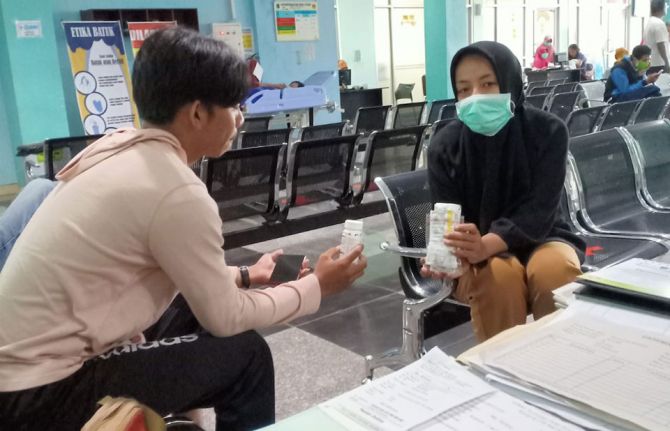
Press Release
Benefits of continuing to provide life-saving HIV services outweigh the risk of COVID-19 transmission by 100 to 1
13 April 2021 13 April 2021Disruption to HIV services as high as 75% has been reported in some countries—to prevent increased AIDS-related deaths, HIV services must continue during the COVID-19 pandemic
GENEVA, 13 April 2021—UNAIDS and the World Health Organization (WHO) have supported mathematical modelling to establish the benefits of continuing HIV services compared to the potential harm of additional COVID-19 transmission. The analysis shows that maintaining HIV services would avert between 19 and 146 AIDS-related deaths per 10 000 people over a 50-year time horizon, while the additional COVID-19-related deaths from exposures related to HIV services would be 0.002 to 0.15 per 10 000 people. The analysis demonstrates that the benefits of continuing to provide HIV services during the COVID-19 pandemic far outweigh the risk of additional COVID-19-related deaths.
“The world should make investments now that don’t leave it with such stark trade-offs in the future,” said Peter Ghys, Director, Strategic Information and Evaluation, UNAIDS. “We need to build robust future systems for health that recognize community-led contributions as part and parcel of a resilient system, not as an afterthought.”
The analysis looked at disruptions to four key HIV services: voluntary medical male circumcision, HIV diagnostic testing, viral load testing and programmes to prevent mother-to-child transmission of HIV. It compared COVID-19 deaths in 2020 and 2021 among health workers and clients due to keeping HIV services open with averted AIDS-related deaths occurring now and over the next 50 years due to maintenance of services. The models were applied to countries with a range of HIV and COVID-19 epidemics.
The COVID-19 pandemic has caused widespread disruption to health services, with restrictions in population movements and health services suspended or limited in many countries. The analysis shows that the potential harm of additional COVID-19 transmission occurring in HIV health services needs to be carefully balanced against the benefits of those services, which, the analysis shows, include fewer AIDS-related deaths. These results may seem intuitive, but it is important to realize that some services have been closed to protect people living with HIV from exposure to COVID-19 and its potential lethal outcomes. However, the risk of not keeping those essential HIV services open entails a greater overall risk of death related to lack of prevention of HIV, access to diagnosis and eventual treatment—these trade-offs are unacceptable.
While there is some additional short-term risk of COVID-19 transmission associated with providing HIV services, the risk of additional COVID-19 deaths is at least 100 times less than the AIDS-related deaths averted by continuing those services. Additional effort to encourage health-care seeking for HIV services during the ongoing COVID-19 pandemic may be needed.
“Ministries of health take into account many factors in deciding when and how to offer essential health services during the COVID-19 pandemic,” said Meg Doherty, Director of WHO’s Global HIV, Hepatitis and Sexually Transmitted Infections Programmes. “This work shows that taking the longer view, the benefits of continuing key HIV services are far larger than the risks of additional COVID-19 transmission; innovative and safe delivery of services must continue as the pandemic is brought under control.”
The full analysis can be found on medrxiv at: https://doi.org/10.1101/2021.03.01.21252663
UNAIDS
The Joint United Nations Programme on HIV/AIDS (UNAIDS) leads and inspires the world to achieve its shared vision of zero new HIV infections, zero discrimination and zero AIDS-related deaths. UNAIDS unites the efforts of 11 UN organizations—UNHCR, UNICEF, WFP, UNDP, UNFPA, UNODC, UN Women, ILO, UNESCO, WHO and the World Bank—and works closely with global and national partners towards ending the AIDS epidemic by 2030 as part of the Sustainable Development Goals. Learn more at unaids.org and connect with us on Facebook, Twitter, Instagram and YouTube.
Contact
UNAIDS GenevaMichael Hollingdale
tel. +41 79 500 2119
HollingdaleM@unaids.org
UNAIDS Media
tel. +41 22 791 4237
communications@unaids.org
Our work
Press centre
Download the printable version (PDF)





